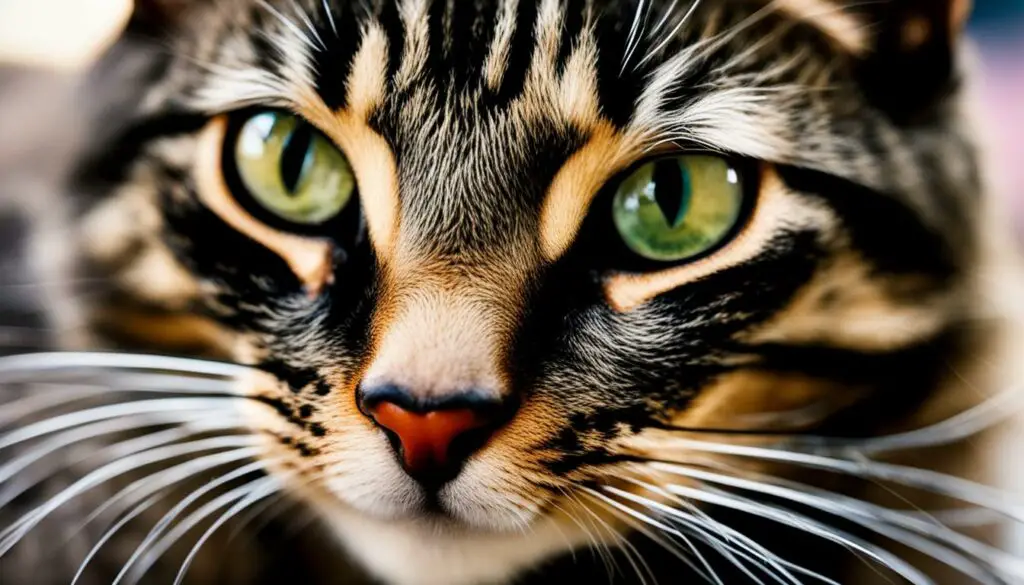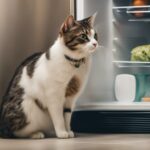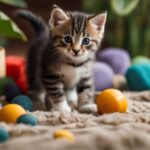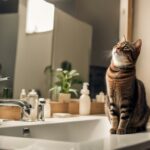Cat panting and meowing are two behaviors that cat owners often encounter. These behaviors may be a normal part of a cat’s communication or may indicate underlying health issues. It is essential to understand why your cat is panting or meowing excessively to ensure their well-being. In this comprehensive guide, I will explore the various reasons behind cat panting and meowing and provide insights on how to address these behaviors effectively.
Key Takeaways:
- Excessive meowing in cats can be a sign of various issues, including pain, health problems, or emotional needs.
- Understanding the specific reasons behind your cat’s meowing can help you address any underlying problems.
- Panting in cats is less common than in dogs and may be a sign of heat, stress, or health issues.
- If your cat is panting or meowing excessively, it is advisable to consult with a veterinarian for a proper evaluation and guidance.
- Providing a safe and comfortable environment for your cat can help alleviate stress and reduce excessive meowing or panting.
Why Does My Cat Keep Meowing?
Excessive meowing in cats can be concerning for pet owners, and it’s important to understand the reasons behind this behavior. Cats meow as a form of communication, and there can be various factors contributing to their persistent meowing.
One common reason for excessive meowing is hunger or thirst. If your cat’s mealtime is approaching or their water bowl is empty, they may vocalize their needs. Loneliness and boredom can also lead to increased meowing, as cats are social animals that require stimulation and companionship.
Stress and anxiety are another potential cause of excessive meowing. Cats may meow more if they are in a new environment, during loud or chaotic situations, or when they are experiencing changes in their routine. It’s important to create a calm and secure environment for your cat to help alleviate their anxiety.
Additionally, medical conditions can contribute to excessive meowing in cats. Pain, urinary issues, kidney disease, hyperthyroidism, or feline cognitive dysfunction can all cause increased vocalization. If you notice a sudden change in your cat’s meowing behavior or if it becomes persistent, it’s essential to consult with a veterinarian to rule out any underlying health problems and address your cat’s needs.
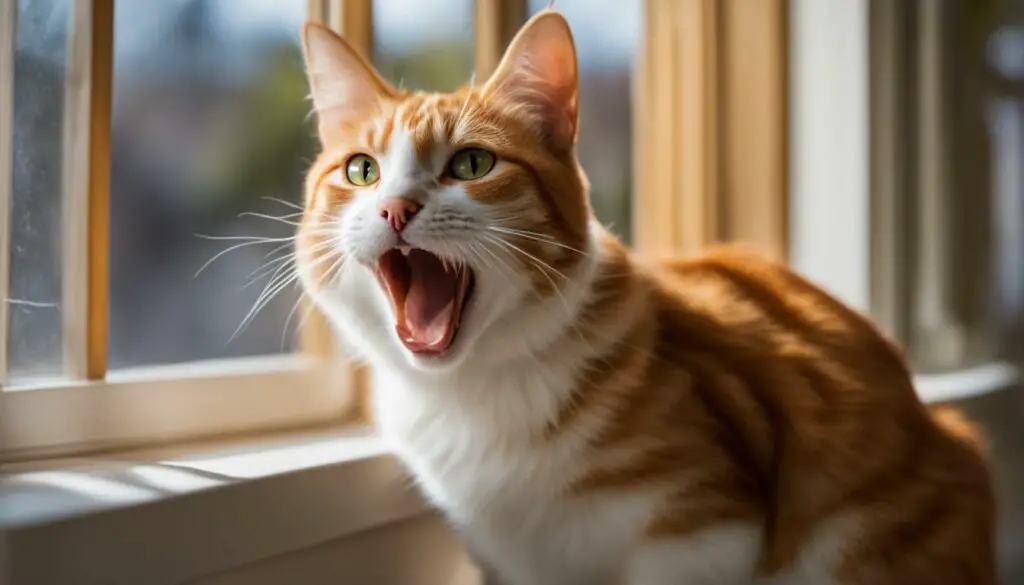
Table: Common Reasons for Cat Meowing
| Reasons for Meowing | Description |
|---|---|
| Hunger/Thirst | Cats may meow excessively if they are hungry or thirsty. |
| Loneliness/Boredom | Meowing can be a sign of cats seeking attention or stimulation. |
| Stress/Anxiety | Changes in the environment or routine can cause cats to meow more. |
| Medical Issues | Underlying health conditions such as pain or urinary problems can contribute to excessive meowing. |
Understanding the reasons behind your cat’s meowing can help you address their needs and ensure their well-being. By providing a comfortable and enriching environment, seeking veterinary attention when necessary, and addressing any underlying health issues, you can help reduce excessive meowing in your feline companion.
Why Is My Cat Meowing at Night?
Many cat owners have experienced the frustration of a cat meowing excessively at night. Understanding why your cat engages in this behavior can help address their needs and improve their overall well-being.
There are several reasons why cats meow at night. One common cause is boredom or a desire for attention. Cats are nocturnal animals and may become restless during the night when their owners are asleep. They may meow to engage their owners in play or to seek companionship.
Another possible reason for nighttime meowing is hunger. Cats have small stomachs and may need to eat more frequently than humans. If your cat’s meowing is accompanied by attempts to find food or leading you to their food bowl, they may be signaling that they are hungry.
| Reasons for Cat Meowing at Night | Description |
|---|---|
| Boredom or Attention-Seeking | Cats may meow at night to engage their owners in play or seek companionship. |
| Hunger | Cats with small stomachs may meow at night to signal that they are hungry. |
| Medical Issues | In some cases, excessive nighttime meowing may be a sign of underlying medical conditions such as hypertension or cognitive dysfunction. |
If you’re concerned about your cat’s nighttime meowing, it’s important to monitor their behavior and ensure their basic needs are met. Providing engaging toys and activities during the evening can help alleviate boredom. Feeding your cat a small meal right before bedtime may also help satisfy their hunger throughout the night.
However, if your cat’s meowing persists or is accompanied by other concerning symptoms, it’s best to consult with a veterinarian. They can rule out any medical issues and provide guidance on how to manage your cat’s nighttime meowing effectively.
Why Is My Kitten Meowing So Much?
If you have a kitten that is meowing excessively, you may be wondering why they are displaying this behavior. Kittens are known for being more vocal than adult cats, as they are still learning to communicate their needs and wants. However, excessive meowing in kittens can also indicate distress or illness, and it is important to determine if there is an underlying issue that needs attention.
One common reason why kittens meow a lot is to signal their need for food. Kittens have small stomachs and high energy levels, so they may meow to let you know that they are hungry. Ensuring that your kitten is receiving regular, appropriate meals can help reduce excessive meowing due to hunger.
| Reasons for Excessive Meowing in Kittens | Solutions |
|---|---|
| Attention-seeking | Ensure your kitten receives plenty of playtime, affection, and mental stimulation. |
| Loneliness | Consider getting your kitten a companion or providing interactive toys to keep them entertained. |
| Discomfort or illness | If your kitten’s meowing is accompanied by other concerning symptoms, consult with a veterinarian to rule out any health issues. |
In some cases, excessive meowing in kittens may be a learned behavior. If your kitten has learned that meowing gets them attention or rewards, they may continue to do so even when their needs are met. It is important to not reinforce this behavior by giving in to their demands every time they meow. Instead, focus on providing positive reinforcement for desired behaviors and redirecting their attention to appropriate outlets, such as interactive toys or scratching posts.
Remember, each kitten is unique, and their meowing habits may vary. If you are concerned about your kitten’s excessive meowing or if their behavior is causing distress, consulting with a veterinarian can provide valuable guidance and ensure the well-being of your furry friend.
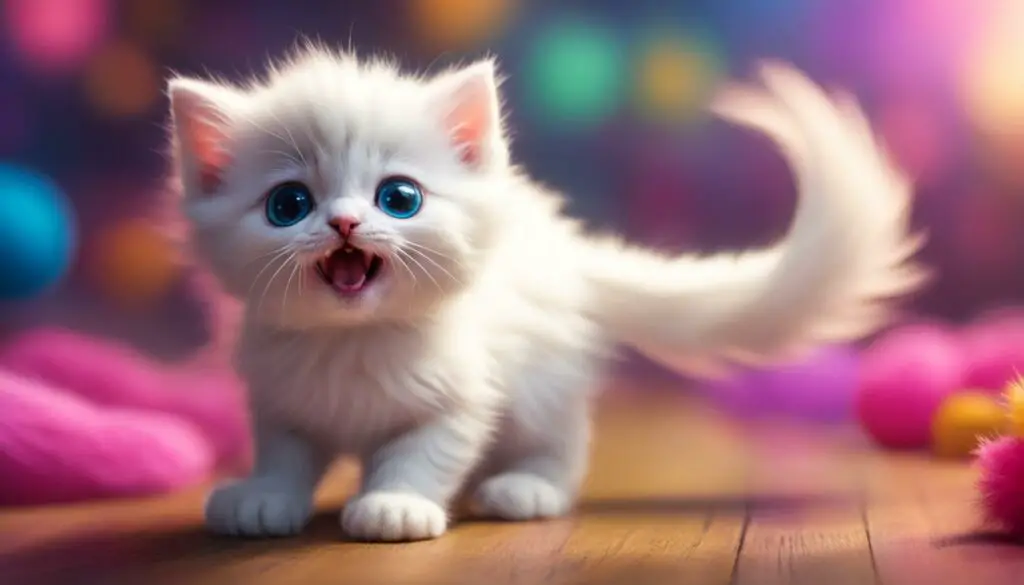
Why Is My Cat Always Hungry and Meowing?
Is your cat constantly meowing and acting like they’re starving? This behavior can be concerning, but there are a few possible explanations for why your cat is always hungry and meowing. One common reason is a medical condition called hyperthyroidism.
Hyperthyroidism is a condition that affects the thyroid gland, causing it to produce an excess amount of thyroid hormone. This can lead to increased appetite in cats, as well as weight loss and other symptoms. If you suspect your cat may have hyperthyroidism, it’s important to have them examined by a veterinarian for a proper diagnosis and treatment.
Another possible reason for your cat’s constant hunger and meowing is behavioral in nature. Some cats have learned that meowing gets them attention or food, so they continue to do it excessively. It’s important not to reinforce this behavior by giving in to their demands every time they meow. Instead, try to establish a consistent feeding schedule and provide interactive toys or activities to keep them mentally stimulated.
| Possible Reasons for Excessive Meowing |
|---|
| Medical conditions like hyperthyroidism |
| Behavioral learned behavior |
| Lack of mental or physical stimulation |
If you’ve ruled out any medical issues and your cat’s hunger and meowing persist, it’s possible that they are not getting enough mental or physical stimulation. Cats need both mental and physical stimulation to stay happy and engaged. Make sure your cat has plenty of toys to play with, scratching posts, and comfortable spaces to relax in. Consider introducing puzzle feeders or interactive toys that require them to work for their food, which can help alleviate boredom and reduce excessive meowing.
Remember, if you’re concerned about your cat’s constant hunger and meowing, it’s best to consult with a veterinarian. They can help determine the underlying cause and provide guidance on how to address the issue effectively.
Why Is My Cat Meowing Differently?
If you notice a sudden change in your cat’s meow, such as a hoarse or scratchy sound, it could be indicative of an upper respiratory infection or other underlying health issues. It’s important to pay attention to any changes in your cat’s vocalization because it can be a sign that something is amiss. To ensure your cat’s well-being, it is best to have them examined by a veterinarian to determine the underlying cause of the change in their meow.
“A sudden change in a cat’s meow is often a clue that there may be an underlying health issue that needs attention. It’s essential to have your cat examined by a veterinarian to identify and address the cause of the change.”
In addition to respiratory issues, other potential causes of a change in a cat’s meow include laryngeal paralysis, tumors, and other serious conditions. By seeking veterinary assistance, you can ensure that your furry friend receives the appropriate diagnosis and treatment.
Remember, cats can’t tell us how they’re feeling, so it’s crucial to be observant of any changes in their behavior, including their vocalizations. If your cat’s meow sounds different, don’t hesitate to consult with a veterinarian to provide your beloved pet with the care they need.
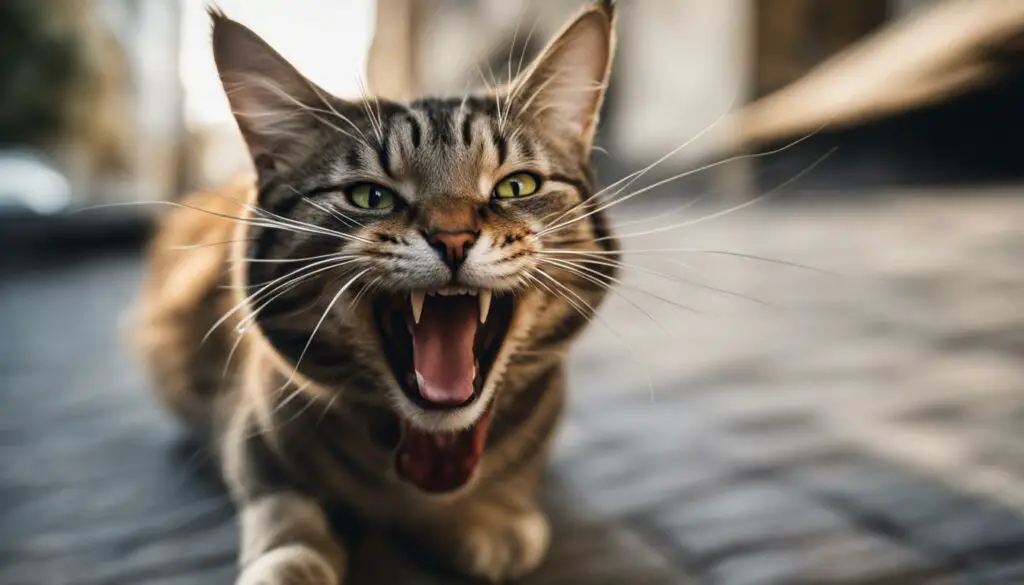
Why Is My Male Cat Yowling?
Male cats may yowl when they are looking for a mate. This behavior is primarily driven by hormones and is a natural instinct for intact male cats. The yowling serves as a way for them to communicate their availability and attract potential mates. However, once a male cat has been neutered, this behavior usually stops. Neutering removes the source of the hormones that drive the yowling, reducing the intensity and frequency of the behavior.
Female cats may also yowl to advertise their availability during mating season. However, spayed females are less likely to engage in this behavior as the surgery removes their reproductive organs, reducing the hormonal influence. It is recommended to have your male cat neutered and your female cat spayed to prevent excessive yowling and to help control the cat population.
| Reasons for Male Cat Yowling | Solutions |
|---|---|
| Mating behavior driven by hormones | Neuter your male cat to reduce yowling |
| Trying to attract female mates | Spay your female cat to reduce yowling |
| Related to the breeding season | Provide a calm and secure environment for your cat |
| Seeking attention or companionship | Engage your cat in play and provide mental stimulation |
If your male cat is yowling excessively, it is important to have him neutered to address the underlying hormonal drive behind the behavior. Neutering not only helps prevent unwanted litters but also benefits your cat’s overall health. If the yowling persists even after neutering or is accompanied by other concerning signs, it is recommended to consult with a veterinarian for further guidance. They can assess your cat’s specific situation and provide appropriate advice to help manage the behavior.
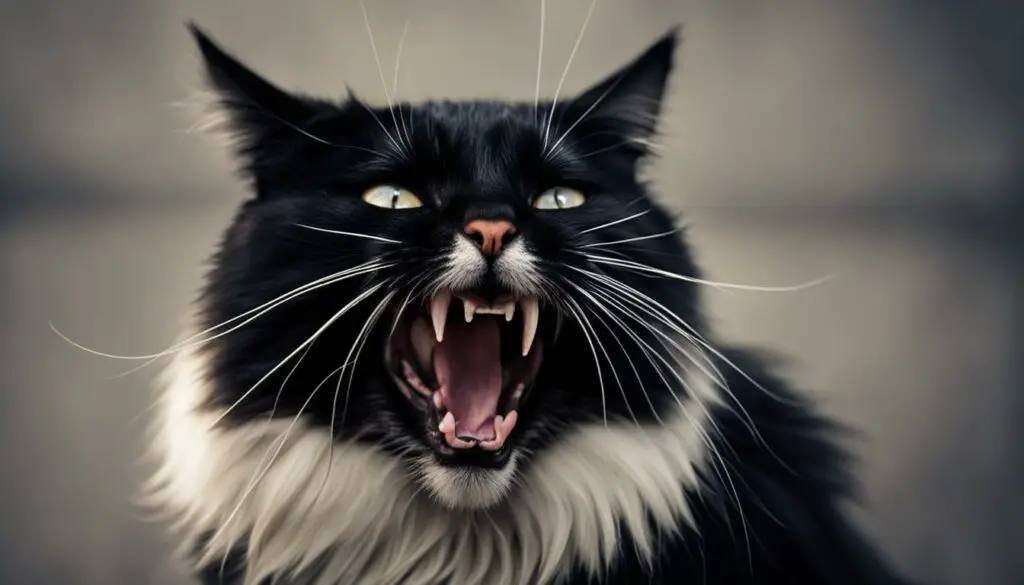
Remember, understanding the reasons behind your male cat’s yowling and taking the necessary steps to address them can help create a harmonious environment for both you and your feline companion.
What to Do if Your Cat Won’t Stop Meowing
If your cat won’t stop meowing, it can be frustrating and concerning. However, there are steps you can take to address excessive meowing in cats and help your furry friend find peace. Here are some tips:
1. Identify the cause:
The first step in addressing excessive meowing is to identify the underlying cause. Is your cat meowing because they are hungry, bored, or in pain? Understanding the reason behind the meowing can help you address their specific needs. If you’re unsure, consult with a veterinarian for guidance.
2. Meet their basic needs:
Make sure your cat’s basic needs are being met. Ensure they have access to fresh food, clean water, and a comfortable, clean litter box. Sometimes, excessive meowing can be a sign that their needs are not being met. By addressing these needs, you may be able to reduce their meowing.
3. Avoid reinforcing the behavior:
While it may be tempting to respond to your cat’s meowing with attention or treats, this can actually reinforce the behavior. Instead, try to ignore the meowing and only give attention or rewards when your cat is calm and quiet. This can help teach them that meowing does not lead to the desired outcome.
If the meowing persists or is accompanied by other concerning signs such as changes in appetite or behavior, it is important to consult with a veterinarian. They can help determine if there are any underlying medical issues that need to be addressed. With patience and understanding, you can work towards reducing excessive meowing and improving your cat’s overall well-being.
Questions to Ask If Your Cat Keeps Meowing
Understanding the triggers behind your cat’s meowing can provide valuable insights into their behavior. By asking specific questions about when and where your cat meows, you can gain a better understanding of their needs and address any potential issues. Here are some important questions to consider:
1. What is the timing of your cat’s meowing?
Understanding the timing of your cat’s meows can help identify any patterns or specific events that may be triggering their vocalization. Does your cat meow more during certain times of the day or in response to specific activities? For example, if your cat tends to meow more in the early morning, they may be hungry and seeking breakfast.
2. Are there any specific triggers for your cat’s meowing?
Try to identify any specific triggers that consistently lead to your cat’s meowing. Is it related to certain people, animals, or objects in their environment? For instance, your cat may meow more when they see birds outside the window or when they want attention from a particular family member.
3. Is your cat spayed or neutered?
The spaying or neutering of your cat can have an impact on their meowing behavior. Intact male and female cats may meow more frequently due to their natural mating instincts. Having your cat spayed or neutered can help reduce excessive meowing related to reproductive behaviors.
By asking these questions and paying close attention to your cat’s behavior, you can gain insight into the reasons behind their excessive meowing and take appropriate steps to address their needs.
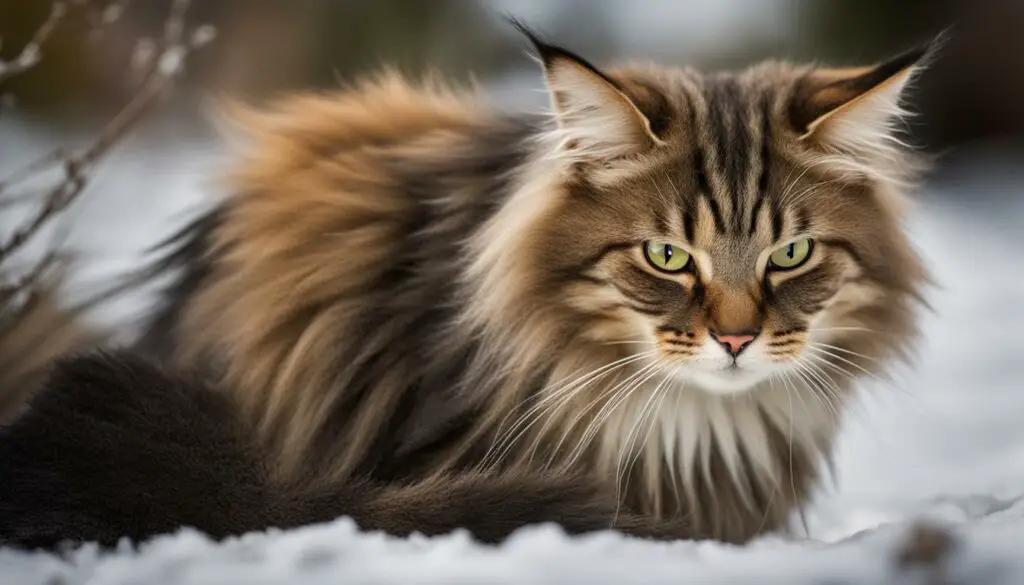
A Closer Look at Panting Cats
Cat panting is a behavior that may raise concerns among cat owners. While panting is more commonly associated with dogs, it can occur in cats as well. Understanding the causes and behaviors associated with cat panting is essential for ensuring the well-being of your furry friend.
There are several possible causes of cat panting. One common reason is overheating. Cats rely on panting as a way to cool down when their body temperature rises. If your cat has been exposed to high temperatures or engaged in strenuous activity, panting can be a natural response to regulate their body temperature.
However, panting in cats can also be a sign of underlying health issues. Respiratory illnesses, asthma, heart failure, and ingestion or inhalation of foreign objects can all lead to panting. It is important to monitor your cat’s behavior and look for accompanying symptoms such as coughing, wheezing, or difficulty breathing. If you notice any concerning signs or if the panting persists, it is recommended to seek veterinary attention.
| Possible Causes of Cat Panting | Description |
|---|---|
| Heat | Cats pant to regulate their body temperature when they are overheated. |
| Pain | Cats may pant as a response to pain caused by various underlying conditions. |
| Respiratory Illness | Certain respiratory conditions can lead to panting in cats. |
| Asthma | Cats with asthma may exhibit panting as a symptom. |
| Heart Failure | Panting can be a sign of heart problems in cats. |
| Ingestion or Inhalation of Foreign Objects | Cats may pant if they have swallowed or inhaled something that is obstructing their airways. |
“Panting in cats can be a natural response to regulate their body temperature or a sign of underlying health issues. It is essential to monitor your cat’s behavior and seek veterinary attention if needed.”
Cat panting should not be ignored, especially if it is accompanied by other concerning symptoms. It is important to assess the situation, monitor for worsening symptoms, and consult with a veterinarian if necessary. Regular veterinary check-ups can also help identify and address any potential health issues before they escalate.
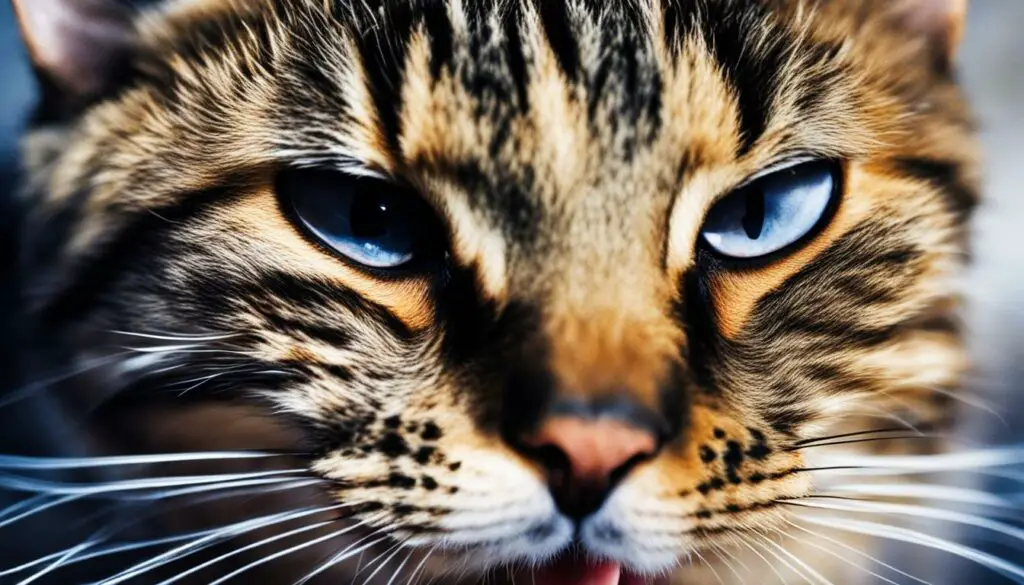
Panting due to Stress/Anxiety
Cats may pant as a result of stress or anxiety, especially during high-intensity or stressful events such as a vet visit or introduction of a new animal or human in the home. The panting in these situations is often accompanied by other signs of distress, such as dilated pupils, rapid breathing, and vocalizations. It is important to provide a calm and familiar environment for your cat to help alleviate their stress and reduce panting.
“When cats experience stress or anxiety, their bodies enter a state of hyperarousal, which can lead to panting,” says Dr. Emily Thompson, a feline behavior specialist. “This panting is a physiological response to the release of stress hormones and increased heart rate.”
If you notice your cat panting from stress or anxiety, it is important to identify and address the underlying cause of their distress. Minimizing exposure to stressful triggers and providing a safe space where your cat can retreat and feel secure can help reduce their anxiety levels. Additionally, using pheromone diffusers or calming products recommended by your veterinarian may help alleviate their stress. In severe cases, anti-anxiety medications may be prescribed.
Remember that each cat is unique, and what may cause stress or anxiety in one cat may not affect another. It is essential to observe your cat’s behavior and consult with a veterinarian if you have concerns about their panting or overall well-being.
| Signs of Stress/Anxiety in Cats | Ways to Reduce Stress/Anxiety in Cats |
|---|---|
|
|
Cooling Down a Panting Cat
When a cat is panting, it may be a sign that it is overheating. Cats regulate their body temperature through panting, and if they are unable to cool down, it can be dangerous for their health. As a responsible cat owner, it is important to know how to help your cat cool down when it is panting.
Firstly, you can move your cat to a cool, shaded area with good airflow. This could be a room with air conditioning or a fan. Providing a cool and comfortable environment will help your cat lower its body temperature.
Additionally, you should offer your cat access to cool water. Hydration is essential in keeping your cat cool and preventing heatstroke. You can also wipe your cat with a wet cloth to help cool it down further.
It’s crucial to monitor your cat’s panting closely. If the panting persists or worsens, it may be a sign of heatstroke, which is a life-threatening condition. In such cases, seek immediate veterinary attention to ensure the well-being of your cat.
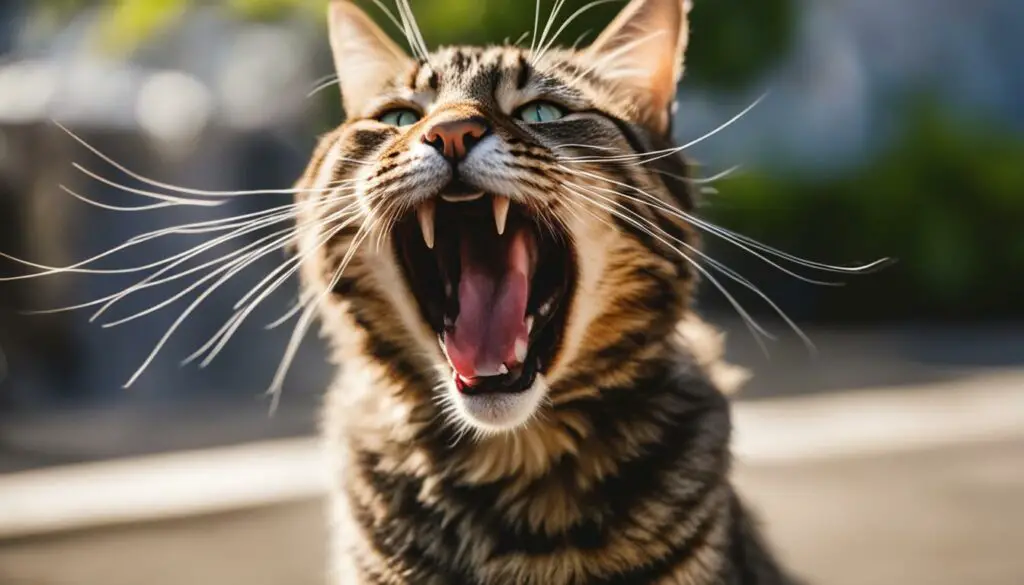
Tips for Cooling Down a Panting Cat:
- Move your cat to a cool, shaded area with good airflow.
- Offer your cat access to cool water to keep it hydrated.
- Wipe your cat with a wet cloth to help lower its body temperature.
- Monitor your cat’s panting closely and seek veterinary attention if it persists or worsens.
Panting After Exercise: Understanding Your Cat’s Post-Playtime Behavior
After a vigorous play session, you may notice that your cat is panting. This post-exercise panting is a natural response to physical exertion and is similar to how humans catch their breath after a workout. It’s important to understand why cats pant after exercise and how to ensure their well-being during this time.
Panting after playtime in cats is the result of increased respiratory and heart rates, allowing them to cool down and regulate their body temperature. Unlike dogs, panting is not a normal behavior for cats and should be temporary. If your cat continues panting excessively or shows other concerning symptoms, it is best to consult with a veterinarian for further evaluation.
During the panting phase, it is crucial to provide a calm and stress-free environment for your cat. Allow them to rest and recover by offering a quiet space with access to fresh water. Avoid any additional exercise or play until their breathing returns to normal. Monitoring your cat’s recovery process is important, and if you notice any worsening of symptoms or prolonged panting, seeking veterinary assistance is recommended.
“Panting after exercise in cats is a normal behavior, but it should be temporary and resolve on its own. If you notice any concerning signs or prolonged panting, it is always best to consult with a veterinarian for proper guidance and peace of mind.” – Veterinarian Dr. Smith
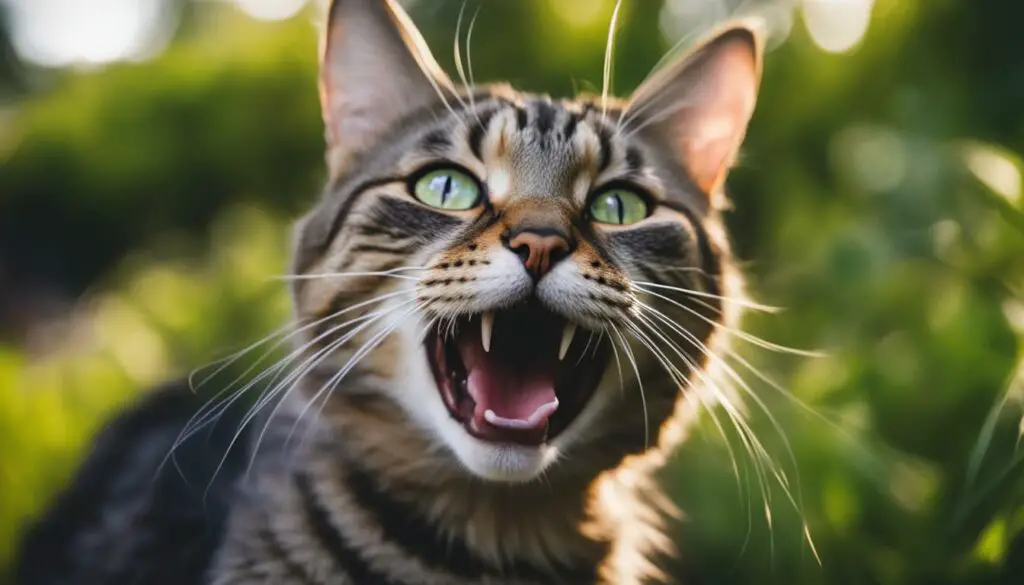
The Benefits of Playtime and Exercise for Cats
Regular playtime and exercise are essential for maintaining a healthy and happy cat. Engaging in interactive play not only provides mental stimulation but also helps to prevent obesity and promote muscle tone. The physical activity during playtime allows cats to release their energy and satisfy their natural hunting instincts.
By incorporating play sessions into your cat’s daily routine, you can help prevent excessive weight gain, reduce stress and boredom, and improve their overall well-being. However, it’s important to remember that each cat has different energy levels and preferences, so finding activities that they enjoy is key. Whether it’s chasing a toy, batting at a feather wand, or engaging in puzzle games, the goal is to keep your cat active and entertained.
Summary
Panting after exercise in cats is a normal response to physical exertion and helps regulate body temperature. It is important to provide a calm and stress-free environment for your cat to rest and recover after playtime. If panting continues excessively or is accompanied by other concerning symptoms, consulting with a veterinarian is advised. Regular playtime and exercise are crucial for a cat’s overall well-being, providing physical and mental stimulation. By incorporating fun and engaging activities into their daily routine, you can help keep your cat healthy, happy, and fulfilled.
Pain-induced Panting in Cats
When a cat starts panting, it can be a sign of pain or discomfort. Panting in cats is not as common as in dogs, so it’s important to pay attention when it does occur. If your cat suddenly starts panting without an apparent cause, it’s crucial to check for other signs of pain or distress. Look for behavioral changes, such as aggression or defensiveness, as well as physical indications like limping or guarding certain areas of their body.
Pain-induced panting in cats can have various causes, including injuries, infections, or underlying medical conditions. It’s essential to consult with a veterinarian to determine the source of your cat’s pain and develop an appropriate treatment plan. The vet will likely conduct a thorough examination, potentially including blood tests, X-rays, or other diagnostic procedures to pinpoint the issue.
Once the source of pain is identified, the veterinarian may recommend pain management strategies, such as medication or physical therapy. They will also provide guidance on how to monitor your cat’s condition and ensure their comfort. Remember, cats are masters at hiding pain, so it’s crucial to act promptly if you notice any signs of discomfort or unusual behavior.
| Signs of Pain in Cats | Causes of Pain |
|---|---|
|
|
Being attentive to your cat’s behavior and addressing any signs of pain or distress are crucial for their overall well-being. Remember, cats are resilient and can often overcome their discomfort with proper care and treatment. If you suspect your cat is experiencing pain-induced panting, don’t hesitate to reach out to your veterinarian for guidance and support.
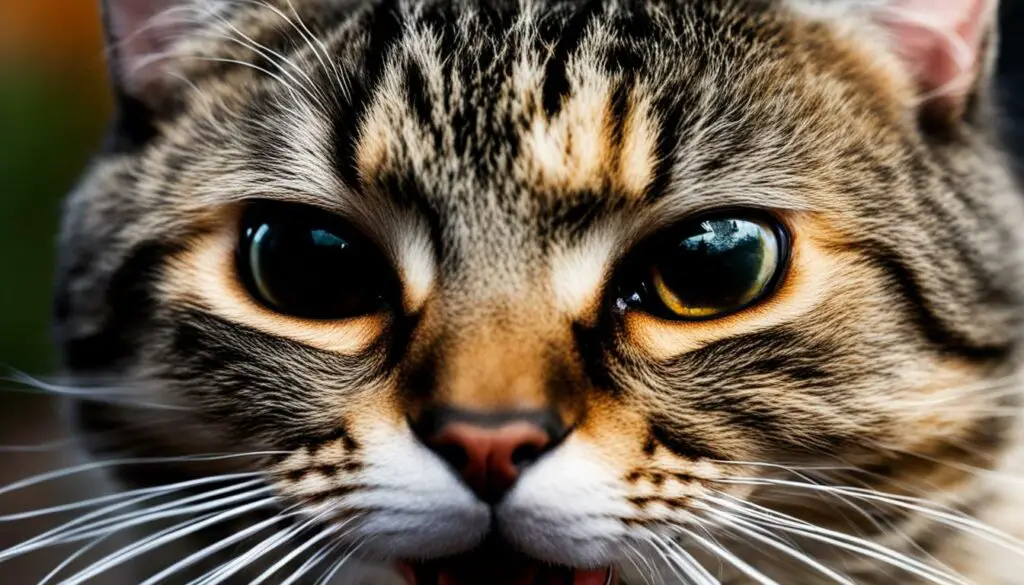
Conclusion
Understanding why cats pant and meow excessively is crucial for their overall well-being. Excessive meowing can be a sign of various underlying issues, including pain, illness, stress, or even just a desire for attention. Similarly, panting in cats can indicate overheating, stress, anxiety, or respiratory problems.
It is important to address these behaviors and determine the underlying causes. If your cat is meowing excessively or panting, consulting with a veterinarian is highly recommended. They can assess your cat’s health, diagnose any potential issues, and provide appropriate treatment.
By addressing excessive meowing and panting, you can help improve your cat’s quality of life. Meeting their basic needs, providing a calm and stimulating environment, and seeking professional guidance when necessary are essential steps in ensuring the well-being of your feline companion.
FAQ
Why does my cat keep meowing?
Cats meow for various reasons, including pain, urinary issues, kidney disease, hyperthyroidism, feline cognitive dysfunction, deafness or loss of hearing or sight, hunger, thirst, loneliness, boredom, stress, breed traits, mating habits, attention-seeking, learned behavior, desire to go outside, dirty litter box, and wanting to play. It is important to understand why your cat is meowing excessively to address any underlying issues.
Why is my cat meowing at night?
Meowing at night can be a sign of boredom, frustration, a desire for attention, food, or snacks, hypertension, an overactive thyroid, or cognitive dysfunction. Understanding the reasons behind nighttime meowing can help address the underlying needs of your cat.
Why is my kitten meowing so much?
Kittens meow more than older cats as they are still developing their communication skills. They may meow to communicate their needs or wants, such as food, attention, or playtime. Increased meowing in kittens can also indicate distress or illness, and it is important to determine if there is an underlying issue that needs attention.
Why is my cat always hungry and meowing?
Cats that are always hungry and meowing may have a medical condition called hyperthyroidism. This condition, common in middle-aged to older cats, can result in increased appetite and weight loss. It is important to have your cat examined by a veterinarian to determine if hyperthyroidism or other underlying conditions are causing excessive hunger and meowing.
Why is my cat meowing differently?
A sudden change in a cat’s meow, such as a hoarse or scratchy sound, can be indicative of an upper respiratory infection. Other potential causes of voice change in cats include laryngeal paralysis, tumors, and other serious conditions. If your cat’s meow sounds different, it is important to have them examined by a veterinarian to determine the underlying cause.
Why is my male cat yowling?
Male cats may yowl when they are looking for a mate, primarily driven by hormones. This behavior usually stops once the cat has been neutered. Female cats may also yowl to advertise their availability, but spayed females are less likely to engage in this behavior. It is recommended to have your cat spayed or neutered to prevent excessive yowling.
What to do if your cat won’t stop meowing?
If your cat won’t stop meowing, it is important to identify the cause and address their needs. Ensure that basic needs such as food, water, and a clean litter box are met. If the meowing is attention-seeking, it is important not to reward the behavior and instead find other ways to engage with your cat. If the meowing persists or is accompanied by other concerning signs, consult with a veterinarian.
What questions should I ask if my cat keeps meowing?
Asking questions about when and where your cat meows can provide valuable insights into the triggers for their meowing. The timing of meowing, whether it is related to specific events or certain times of the day, can offer clues about the underlying cause. Additionally, knowing if your cat is spayed or neutered and their breed can provide further context for their meowing behavior.
Why is my cat panting?
Cat panting is not as common as dog panting and can indicate underlying problems such as heat, pain, respiratory illness, asthma, heart failure, and ingestion or inhalation of foreign objects. It is important to assess the situation, monitor for worsening symptoms, and seek veterinary attention if necessary.
Why is my cat panting due to stress/anxiety?
Cats may pant as a response to stress or anxiety, especially during high-intensity or stressful events such as a vet visit or introduction of a new animal or human in the home. Providing a quiet and familiar space for your cat to calm down can help alleviate their stress and reduce panting. Calming products or anti-anxiety medications may also be recommended in certain cases.
Why is my cat panting from overheating?
Overheating can cause panting in cats. It is important to move a panting cat to a cool, shaded area with air conditioning or a fan to help them cool down. Providing access to cool water and wiping them with a wet cloth can also aid in cooling. Heatstroke is a life-threatening condition, so immediate action should be taken to prevent it.
Why is my cat panting after exercise or playtime?
Cats may pant after strenuous exercise or play. This panting should only last for a short time. Allowing your cat to rest and providing a calm environment can help them recover. If panting worsens or is accompanied by other concerning symptoms, contacting a veterinarian is recommended.
Why is my cat panting from pain?
Cats may pant as a response to pain. If your cat is panting suddenly without an apparent cause, it is important to check for signs of pain such as guarding or defensiveness. Identifying the source of pain and seeking veterinary assistance can help alleviate your cat’s discomfort.

